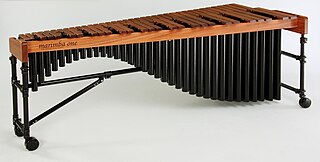
The marimba is a musical instrument in the percussion family that consists of wooden bars that are struck by mallets. Below each bar is a resonator pipe that amplifies particular harmonics of its sound. Compared to the xylophone, the timbre of the marimba is warmer and more pure. It also tends to have a lower range than that of a xylophone. Typically, the bars of a marimba are arranged chromatically, like the keys of a piano. The marimba is a type of idiophone.
Martin Denny was an American pianist and composer best known as the "father of exotica." In a long career that saw him performing well into the 1980s, he toured the world popularizing his brand of lounge music which included exotic percussion, imaginative rearrangements of popular songs, and original songs that celebrated Tiki culture.
Arthur Lyman was an American jazz vibraphone and marimba player. His group popularized a style of faux-Polynesian music during the 1950s and 1960s which later became known as exotica. His albums became favorite stereo-effect demonstration discs during the early days of the stereophonic LP album for their elaborate and colorful percussion, deep bass and 3-dimensional recording soundstage. Lyman was known as "the King of Lounge music."
Exotica is a musical genre, named after the 1957 Martin Denny album of the same name that was popular during the 1950s to mid-1960s with Americans who came of age during World War II. The term was coined by Simon "Si" Waronker, Liberty Records co-founder board chairman. The musical colloquialism exotica means tropical ersatz, the non-native, pseudo experience of insular Oceania, Southeast Asia, Hawaii, the Amazon basin, the Andes, the Caribbean and tribal Africa. Denny described the musical style as "a combination of the South Pacific and the Orient...what a lot of people imagined the islands to be like...it's pure fantasy though." While the South Seas forms the core region, exotica reflects the "musical impressions" of every place from standard travel destinations to the mythical "shangri-las" dreamt of by armchair safari-ers.
Adiemus is a series of new-age music albums by Welsh composer Karl Jenkins. It is also the title of the opening track on the first album of the series, Adiemus: Songs of Sanctuary, recorded in 1994 and released the next year.
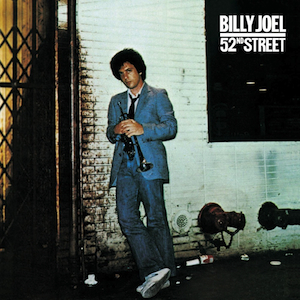
52nd Street is the sixth studio album by American singer-songwriter Billy Joel, released on October 11, 1978. The follow-up to his breakthrough success album, The Stranger, Joel tried to give the album a fresh sound, hiring various jazz musicians to differentiate it from his previous albums.

Welcome is the fifth studio album by Santana, released in 1973. It followed the jazz-fusion formula that the preceding Caravanserai had inaugurated, but with an expanded and different lineup this time. Gregg Rolie had left the band along with Neal Schon to form Journey, and they were replaced by Tom Coster, Richard Kermode and Leon Thomas, along with guest John McLaughlin, who had collaborated with Carlos Santana on Love Devotion Surrender. Welcome also featured John Coltrane's widow, Alice, as a pianist on the album's opening track, "Going Home" and Flora Purim on vocals. This album was far more experimental than the first four albums, and Welcome did not produce any hit singles.

Rain Tree Crow is the sole album released by English band Rain Tree Crow, a reunion project by the members of the new wave band Japan. Recorded in 1989 and 1990 and released in April 1991, it was the first time that members David Sylvian, Mick Karn, Steve Jansen and Richard Barbieri had collaborated as a four-piece since 1982. The album peaked at number 24 on the UK Albums Chart.
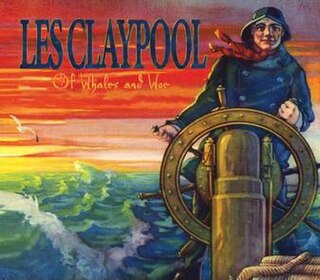
Of Whales And Woe is the first solo album by Les Claypool, the bassist and vocalist of Primus. The album was released on May 30, 2006. The album features Skerik, Mike Dillon, and Gabby La La (multi-instrumentalist). "Back off Turkey" also features Les' children, Cage and Lena. The track "Iowan Gal" is a love song for his wife, Chaney Claypool.
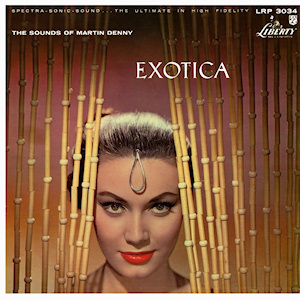
Exotica is the first album by Martin Denny, released in 1957. It contained Les Baxter's most famous piece, "Quiet Village", and spawned an entire genre bearing its name. It was recorded December 1956 in Webley Edwards' studio in Waikiki. The album topped Billboard's charts in 1959.
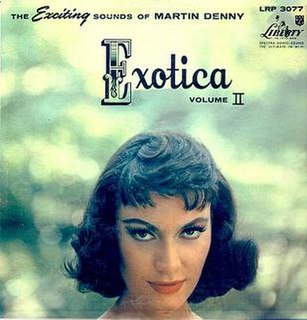
Exotica Volume II was the second album by Martin Denny, released in 1958.
The Baja Marimba Band was a musical group led by marimba player Julius Wechter. Formed by producer Herb Alpert after his own Tijuana Brass, the Baja Marimba Band outlasted the Tijuana Brass by several years in part due to TV producer Chuck Barris, who included the group's music on his game shows in the 1970s.
"Quiet Village" is an orchestral pop instrumental that was written and originally performed by Les Baxter in 1951 and an instrumental album from 1959 by Martin Denny. In the liner notes to his album, Ritual of the Savage , Baxter described the themes he was conveying in the work:
[t]he jungle grows more dense as the river boat slowly makes its way into the deep interior. A snake slithers into the water, flushing a brilliantly plumaged bird who soars into the clearing above a quiet village. Here is a musical portrait of a tropical village deserted in the mid-day heat.
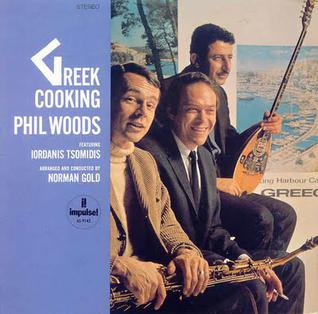
Greek Cooking is an album by American saxophonist Phil Woods featuring performances recorded in 1967 for the Impulse! label.
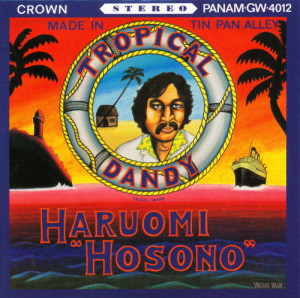
Tropical Dandy is Haruomi Hosono's second solo album. This album continues the tropical style of Hosono House and also features performances from "Caramel Mama". This album was re-issued as part of a box set with bonus tracks taken from Tin Pan Alley albums by Crown decades later.

Quiet Village: The Exotic Sounds of Martin Denny was the eighth album by Martin Denny. Released in the summer of 1959, the monophonic version of the album reached No. 21 on the Billboard monophonic album chart in November 1959, and the stereophonic version reached No. 12 on the magazine's stereophonic album chart in January 1960.
Forbidden Island was the third album by Martin Denny. The album was produced in March 1958 at the Liberty Studios in Hollywood, following the group's nine-month gig performing at Don the Beachcomber's Bora Bora Lounge in Hawaii. Forbidden Island was Denny's first album to be recorded and released after vibraphonist Arthur Lyman left the group to pursue his own solo career. The album includes four original compositions by Denny: "Cobra", "Exotica", "Primitiva", and "Forbidden Island".
Primitiva (LRP-3087/LST-7023) was the fourth album by Martin Denny. Released in August 1958, it was recorded at Liberty Studios in Hollywood and released on Liberty Records. In October 1958, it reached No. 27 on the national Cashbox chart.
August "Augie" Borero Colon was an American musician known for his work as a percussionist in the exotica genre. He came to national fame as a member of Martin Denny's band in the 1950s and was the voice behind the bird calls and jungle sounds of the hit single "Quiet Village". He also recorded two solo albums, Sophisticated Savage (1959) and Chant of the Jungle (1960). In the early 1960s, Colon left Denny's group and toured with his own band known as The Tropicales.
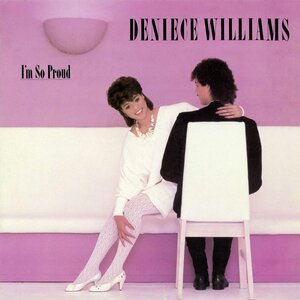
I'm So Proud is an album by American singer Deniece Williams which was released in 1983 on Columbia Records. The album reached No. 10 on the Billboard Top Soul Albums chart.










